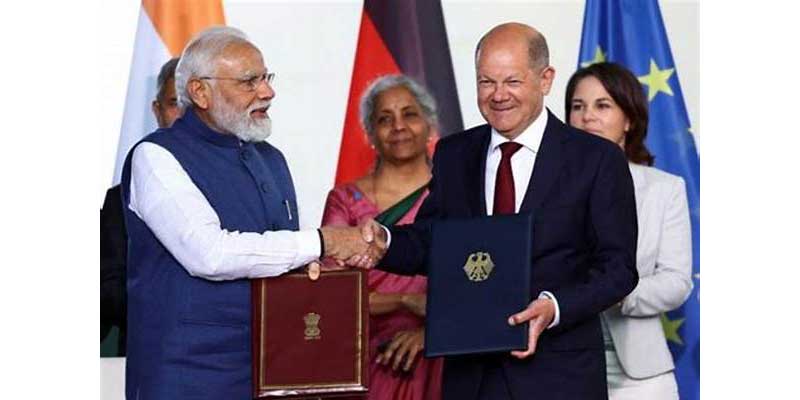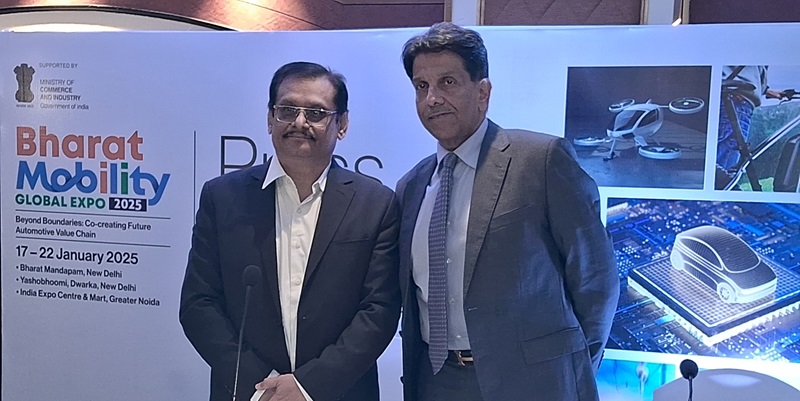Schedule a Call Back
Indo-Germany trade alliance: A model of resilience and growth
 Articles
Articles- Apr 01,24

In the ever-evolving global trade landscape, the partnership between India and Germany stands out as a shining example of resilience and opportunity. Over centuries, these two nations have cultivated a strong foundation of economic exchange, weaving a rich tapestry of trade and cooperation that has endured the test of time. From the historical Silk Road to modern-day trade routes, India and Germany have continuously engaged in commerce, evolving into a robust collaboration that transcends geographical boundaries and enriches both economies.
With a trade history spanning over 500 years, India and Germany share a deep-rooted connection forged through centuries of economic cooperation. Over time, bilateral trade has not only increased but has also led to the discovery of new business and investment prospects by German companies in India and vice versa. From the 16th to the 18th centuries, numerous German enterprises were established with the intent of engaging in trade with India and other East Asian nations. This longstanding relationship is characterised by mutual respect, trust, and a shared vision for prosperity, making it a beacon of stability and growth in the dynamic landscape of global trade.
In recent times, this partnership has flourished significantly, witnessing an exponential surge in bilateral trade, solidifying India and Germany's positions as pivotal trading partners for each other. India, recognised as one of the fastest-growing economies globally, presents a plethora of opportunities for German companies. Presently, over 2000 German companies are actively operating in India, contributing to approximately 400,000 direct and indirect employment opportunities. Furthermore, Germany holds the position of being India's largest trading partner in Europe and features among India's top ten global trade partners, and is the seventh largest Foreign Direct Investment (FDI) source for India. The collaboration between India and Germany extends to over 1600 partnerships and encompasses more than 600 joint ventures. To facilitate the exploration of business prospects in India, various initiatives and programs have been instituted, including the Fast-Track-System for German companies and the Make-in-India Mittelstand-Program. These endeavours aim to streamline processes and support the realisation of business opportunities in India. The total bilateral trade between the two countries stood at $31.4 billion during the year 2022, marking a notable increase from $21.76 billion in FY 2020–21.
In December 2023 alone, Germany exported approximately $1.39 billion worth of goods to India and imported around $1.03 billion from India, resulting in a positive trade balance of approximately $364 million. What sets the Indo-German trade relationship apart is its inherent reciprocity, with both nations reaping mutual benefits from their collaborative endeavours.
Germany's advanced technology and manufacturing prowess perfectly complement India's burgeoning market potential and highly skilled workforce, resulting in fruitful collaborations across various industrial sectors. This synergy has been particularly evident in sectors such as automotive, engineering, pharmaceuticals, renewable energy, and machinery, where joint ventures and strategic partnerships have flourished. In the fiscal year 2023, India's exports to Germany reflected the depth of this collaboration, with a total of 5,842 commodities exported, amounting to approximately $10.13 billion. Notably, between April and November 2023 alone, India's exports to Germany reached $6.29 billion, showcasing sustained growth and partnership.
Major exported items spanned across various sectors, underscoring the diversity of India's export portfolio. Electrical machinery and equipment emerged as the top category with exports valued at $725 million, followed closely by ready-made garments made of cotton, including accessories, at $571 million. Additionally, telecom instruments accounted for $477 million in exports, machinery for dairy reached $476 million, and products of iron and steel amounted to $471 million. These figures highlight the depth of collaboration between India and Germany, as well as the significant contributions of various sectors to bilateral trade and economic growth.
Conversely, India imported a total of 5,955 commodities from Germany in fiscal year 2023, with imports totalling approximately $15.93 billion. Notable imports from Germany to India included machinery for dairy valued at $1.96 billion, aircraft, spacecraft, and parts at $1.73 billion, medical and scientific instruments at $872 million, electrical machinery and equipment at $856 million, and auto components and parts at $809 million. During April to November 2023, India's imports from Germany included reactors and parts thereof at $3.16 billion, electrical machinery and equipment at $1.43 billion, aircraft and spacecraft parts at $1.42 billion, and optical, photographic, cinematographic measuring, medical, or surgical apparatus parts and accessories at $1.08 billion. Importantly, imports from Germany to India stood at $11.46 billion during April to November 2023.
Despite notable achievements, persistent challenges persist, particularly in the shortage of skilled labour within the manufacturing sector, posing significant hurdles to further growth. Acknowledging this obstacle, India and Germany are poised to address it through collaborative efforts in vocational training, knowledge exchange programs, and skill development initiatives. Germany's esteemed dual education system serves as a model of success, offering valuable insights for India to refine its educational curriculum. This ensures that the workforce not only acquires essential skills but also remains adaptable to the evolving demands of industry. In addition to addressing labour shortages, sustainability and advanced technologies emerge as critical factors in enhancing global trade competitiveness. Leveraging Germany's expertise in these areas presents a significant opportunity for India to drive sustainable development and technological advancement across various industries.
By implementing innovative solutions and adopting best practices, India can propel its economic growth while contributing to global efforts towards environmental conservation and resource efficiency. Collaboration between India and Germany in these domains is essential for overcoming current challenges and seizing future opportunities. Through strategic partnerships and knowledge exchange, both nations can leverage their respective strengths to foster innovation and competitiveness. This collaborative approach not only benefits the economies of India and Germany but also contributes to global progress towards a more sustainable and technologically advanced future.
Strategic cooperation and ongoing policy dialogue are paramount for India and Germany to strengthen their trade relations, especially in the face of global uncertainties. By creating an environment conducive to collaboration and innovation, both nations can bolster their resilience and adaptability to changing market dynamics. As we look towards the future, the Indo-German trade relationship holds immense potential for further growth and diversification. By nurturing a business-friendly environment, fostering innovation-driven entrepreneurship, and deepening bilateral cooperation, both countries can explore new avenues of economic collaboration and mutual prosperity. To reiterate, India stands to benefit from Germany's renowned vocational training system, which can effectively address its skill gap challenges and enhance workforce readiness for emerging industries. Furthermore, diversifying trade portfolios, minimising trade barriers, and harnessing digital technologies are pivotal strategies that can drive sustained growth and prosperity for both nations. Through collaborative efforts in these areas, India and Germany can not only strengthen their bilateral ties but also contribute significantly to global economic development.
In conclusion, the Indo-German trade partnership serves as a powerful symbol of the potential for synergy and collaboration in our interconnected global landscape. This partnership not only exemplifies mutual success but also lays the foundation for prosperity and sustainable growth for both nations. Given that India is ranked as the 5th and Germany as the 4th largest economies globally, there exists immense potential for both countries to capitalise on their complementary strengths. By leveraging their respective advantages, fostering innovation, and embracing sustainable practices, India and Germany can chart a course towards a brighter future built on collaboration, resilience, and shared prosperity.
The Indo-German trade partnership represents more than just economic cooperation; it embodies a commitment to working together towards common goals in a rapidly changing world. Through joint efforts, both nations can navigate challenges, seize opportunities, and create a sustainable and prosperous future for generations to come. This partnership not only benefits India and Germany but also contributes positively to the global community, showcasing the power of collaboration in driving meaningful change on a global scale.
About the Author
Rajesh Nath is the Managing Director of VDMA India. He has more than 32 years of experience working in various industries in Germany and India. He has been accorded the "Cross of the Order of Merit" – highest civilian award from the German President, for promoting Indo-German Trade in Engineering Sector.
Related Stories

Purvi Products transforms machine tools
The industry is transitioning from traditional tools to automated, high-precision systems.
Read more
IGSS plans major expansion to meet rising sunroof demand in India
Currently, the Chennai facility supplies sunroofs to automotive giants like Hyundai Motor India and Kia India.
Read more
Bharat Mobility Global Expo 2025: Future of mobility
Covering a massive area of over 200,000 square meters, the expo will welcome more than 1,500 exhibitors, over 500,000 enthusiastic visitors, and 5,000 global buyers, establishing itself as a signifi..
Read more










